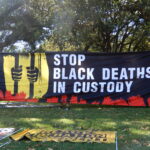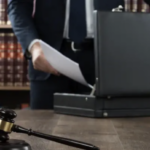The Offence of Choking in New South Wales

Former television personality Andrew O’Keefe has been charged and refused bail over an alleged assault of a woman at his home.
Mr O’Keefe has been accused of grabbing the woman by her by the throat, pushing her to the ground, punching and kicking her. The woman says she was only able to break free by biting him.
He has been charged with two counts of choking a person, three counts of common assault and one count of assault occasioning actual bodily harm.
It’s been reported that Mr O’Keefe was on bail for other alleged offences when the latest incident took place.
His criminal defence lawyers assert that he was acting in self defence.
He has nevertheless been refused bail and will remain in custody until his next court date.
Former White Ribbon ambassador
Mr O’Keefe is a former lawyer and the son of former Supreme Court judge Barry O’Keefe, who served on the bench of the Supreme Court from 1993 to 2004.
Mr O’Keefe senior was also the Commissioner of the Independent Commission Against Corruption (ICAC) from 1994 until 1999.
Andrew O’Keefe left the legal profession and subsequently rose to television fame presenting ‘Deal or No Deal’ and ‘Weekend Sunrise’ on Channel Seven. The media giant terminated his contract last year.
During the time when he had a significant television profile.
Mr O’Keefe was an ambassador for White Ribbon, an organisation which aims to help eradicate violence against women. He was chairman of the organisation in 2017, before it went into liquidation in 2019. It has since been relaunched and Mr O’Keefe is no longer associated with the charity or any of its programmes.
He was also part of the inaugural meeting of national council to Reduce Violence against Women and Children in 2008, which was an initiative of the Rudd government and he was made a Member of the Order of Australia for his charity work, specifically his work with White Ribbon Australia.
Mr O’Keefe has had two previous domestic violence charges against him dismissed. A third charge was withdrawn by police last year, after a magistrate found he was in a hypomanic bipolar state when he spat at his partner, slapped her and kicked her.
At the time, expert reports tendered to the court from psychiatrists and other specialists stated that he suffers from severe bipolar disorder as well as a substance use disorder.
Offences of choking in New South Wales
Section 37 of the Crimes Act 1900 (NSW) contains three offences relating to choking, suffocation or strangulation.
Recklessly choke
Section 37(1) of the Act prescribes a maximum penalty of 10 years in prison where a person:
- Intentionally chokes, suffocates or strangles another so as to render them unconscious, insensible or incapable of resistance, and
- Is reckless as to rendering the other person unconscious, insensible or incapable of resistance.
The Crimes Act does not define the terms choke, suffocate or strangle, so the ordinary meaning of those words apply.
‘Choke’ has been defined as “severe difficulty in breathing because of a constricted or obstructed throat or a lack of air”.
‘Suffocate’ means to “have or cause to have difficulty in breathing”.
And ‘strangle’ means to “squeeze or constrict the neck”.
Intentionally choke
Section 37(2) of the Act prescribes a maximum penalty of 25 years in prison for any person who:
- chokes, suffocates or strangles another so as to render them unconscious, insensible or incapable of resistance, and
- does so with the intention of enabling himself or herself to commit, or assisting any other person to commit, another indictable offence.
An ‘indictable offence’ is one that can be finalised in a higher court, such as the District or Supreme Court.
New offence of choking
In December 2018, the NSW Parliament passed the Crimes Legislation Amendment Bill which inserted a new section 37(1A) into the Crimes Act 1900.
Unlike the existing section 37, subsection (1A) does not require the prosecution to prove that the defendant’s actions were intended to render the complainant unconscious, insensible or incapable of resistance.
The new subsection has significantly broadened the situations where acts of choking can amounts to a discrete criminal offence.
Reasoning behind the offence
According to a Parliamentary Research Paper of September 2018:
“Non-lethal strangulation is a significant form of domestic violence offending designed to exert physical and psychological control over victims. Non-lethal strangulation may also act as indicator of future violence, including homicide.”
The authors of the paper noted that:
“[S]trangulation offences “were not being charged under the NSW offence of strangulation, but rather were being charged as common assault or assault occasioning actual bodily harm offences”.
They further noted that 600 people were charged under section 37 between 2014 and 2018, and less than half of those prosecutions resulted in convictions.
The authors expressed the view that:
- The requirement to prove the defendant’s state of mind is a significant impediment to successfully prosecuting the offence of choking,
- The two year maximum prison sentence applicable to the offence of common assault does not adequately reflect the seriousness of the act of choking, nor does it send a sufficiently strong message to the community that the conduct is socially unacceptable, nor act as a strong enough deterrent to would-be offenders,
- The offence of assault occasioning actual bodily harm – which attracts a five year maximum penalty – is not always applicable to the act of choking because it generally requires the infliction of physical injuries that are “more than transient or trifling”, which are not always occasioned during acts of choking, suffocation or strangulation, and
- The seriousness and prevalence of domestic violence offences in NSW, as well as the fact choking is a common feature of such offences, demands a discrete offence that is not difficult to establish.
As a result of various inquiries and papers, section 37(1A) of the Crimes Act 1900 (NSW) (‘the Act’) was inserted into the Crimes Act 1900.
The offence prescribes a maximum prison term of five years for any person who “intentionally chokes, suffocates or strangles another person without the other person’s consent”.
Defences to choking, suffocation and strangulation offences
A range of defences are available for offences under section 37 of the Crimes Act, including:
- Self-defence,
- Duress, and
- Necessity.
Where evidence of any such defence is raised, the onus then shifts to the prosecution to prove beyond reasonable doubt that it does not apply.
If the prosecution is unable to ‘negative’ the defence, the defendant is entitled to an acquittal.
Going to Court for a Choking Offence?
If you are going to court for choking, suffocation or strangulation, call Sydney Criminal Lawyers anytime on (02) 9261 8881 to arrange a free first conference with an experienced criminal defence lawyer.
Our legal team will ensure you are accurately advised regarding your specific situation – including the strengths and/or weaknesses of the prosecution case and any defences that may be available to you – and fight to achieve the optimal outcome, whether that involves pushing for the withdrawal / downgrading of charges or achieving a verdict of not guilty in court.







